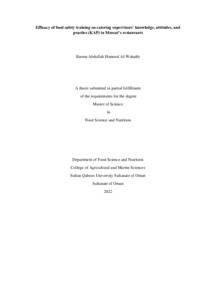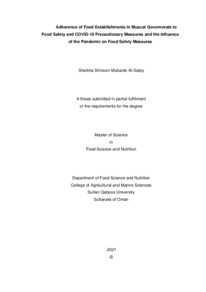Document
Efficacy of food safety training on catering supervisors' knowledge, attitudes, and practice (KAP) in Muscat's restaurants.
Other titles
فعالية التدريب على سلامة الغذاء في معرفة مشرفي تقديم الطعام، والمواقف، والممارسات (KAP (في مطاعم مسقط
Publisher
Sultan Qaboos University.
Gregorian
2022
Language
English
Subject
English abstract
Unhygienic food handling practices lead to most outbreaks of foodborne diseases in the
food business. One effective method to keep food safe is through training food handlers.
In 2017, Muscat Municipality initiated a certified training program for food managers or
supervisors. Since then, no evaluation of the effectiveness of the training program has
taken place. This study aimed to evaluate the efficacy of the training program on food
safety knowledge, attitudes, and self-reported practices (KAP) of food
managers/supervisors in Muscat Governorate. Food safety KAP among 184 food
supervisors in food service establishments in Muscat, Sultanate of Oman, was evaluated.
The data was collected through a questionnaire consisting of four sections: demographic
characteristics, knowledge, attitudes, and practice. The results showed that most food
handlers were 31 to 40 years old, 58% had more than a high school education, and 69%
were from Southern Asia. In addition, about 46.2% of food supervisors had completed a
food safety training course required by Muscat Municipality, attended in 2017, and the
language of the course was mainly English. There was a significant (p < 0.05) association
between food safety KAP and food managers' education and food safety training
enrollment. Supervisors who took training had higher scores mean of knowledge of
102.99 than the untrained 83.49. The mean rank of attitude for trained supervisors was
100.79, and for untrained, it was 85.38. Also, the mean practice rank was higher for
trained supervisors than untrained ones, which were 103.72 and 82.86, respectively. In
addition, there was a significant correlation between food safety knowledge and food
supervisors' work experience. A significant positive correlation was detected between
knowledge and attitude (rho = 0.588, p < 0.05), knowledge with practice (rho = 0.417, p
< 0.05), and attitude with practice (rho = 0.348, p < 0.05).
Although food supervisors' knowledge, attitude, and practice levels were satisfactory, the
study suggests that several aspects related to improper handling of food, time and
temperature control, and prevention of food poisoning should be emphasized. Training
should be mandatory for all food managers and food handlers.
Member of
Resource URL
Arabic abstract
أدت الممارسات غير الصحية أثناء تداول الطعام إلى تفشي الأمراض المنقولة عن طريق الأغذية والتي تسببها المطاعم ، إن تدريب متداولي الطعام يعتبر من إحدى الطرق الفعالة للحفاظ على سلامة الغذاء.
Category
Theses and Dissertations


